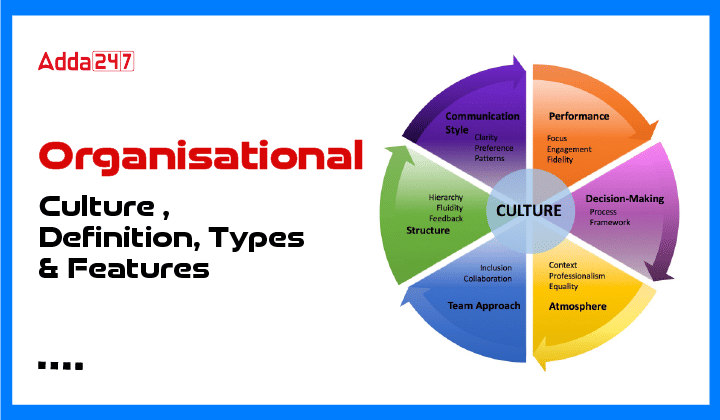Table of Contents
Organisational culture is a dynamic and pervasive phenomenon that profoundly influences how groups and societies function. It encompasses a rich tapestry of shared beliefs, assumptions, values, norms, symbols, and practices that intricately shape the interactions and behaviours of individuals within an organisation. in this article, we will discuss the concept of organisation culture in detail.
Organisational Culture Overview
Organisational culture serves as the guiding compass for any entity, steering its identity and decision-making processes. It shapes the beliefs, values, and norms that individuals within the organisation uphold, thereby playing a pivotal role in determining its overall success. To gain a comprehensive understanding of the profound influence of organisational culture, we must delve deeper into its core components and explore the myriad forms it can assume within different organisations.
What is Organisational Culture?
Culture can be defined as the distinctive prevailing framework of common beliefs, assumptions, values, and norms that influence the socialisation, symbols, language, and customs within a particular community.
Organisation culture encompasses the attitudes and methodologies that characterise how individuals execute their duties. Culture evolves and is conveyed by individuals, both knowingly and unknowingly, to future generations.
Components of Organisational Culture
At its heart, organisational culture consists of shared assumptions, values, norms, symbols, and the process of socialisation:
- Shared Assumptions: These are the implicit beliefs and emotions that members of a culture often take for granted, holding them as self-evident truths. These assumptions create the groundwork for how individuals within the culture perceive and interact with the world.
- Values and Norms: Values represent the fundamental beliefs that specify general preferences and behaviours. They delineate what is deemed right or wrong, forming the ethical framework for the culture. Norms, conversely, are the explicit rules that govern the behaviour of individuals within groups, setting the standard for how they should act.
- Symbols: Symbols are tangible or observable representations of meaning within a culture. These can take various forms, including artefacts such as clothing or office layouts, as well as rituals and ceremonies. Symbols serve as powerful conduits for conveying cultural values and expectations.
- Socialisation: Socialisation is the process by which individuals, particularly newcomers, acquire the values, norms, behaviours, and social skills of the culture they are entering. It serves as the bridge that integrates new members into the existing cultural framework.
Types of Organisational Culture
Organisational culture is not a monolithic concept but exhibits a diverse range of manifestations. The most common types of organisational culture include:

Bureaucratic Culture
In a bureaucratic culture, the behaviour of employees is meticulously governed by formal rules and standard operating procedures. Such a culture places a premium on stability and predictability. Organisations characterised by a bureaucratic culture often produce standardised goods and services. Examples of such entities include government ministries and fast-food establishments.
Clan Culture
Conversely, in a clan culture, individual behaviours are primarily shaped by tradition, loyalty, personal commitment, extensive socialisation, and self-management. This culture fosters unity through socialisation, where long-standing employees take on mentoring roles. Members of the organisation exhibit a deep awareness of its history and operate in line with established codes of conduct, instilling a sense of pride and shared values. Peer pressure plays a pivotal role in reinforcing adherence to important norms.
Market Culture
A market culture revolves around the pursuit of measurable and demanding goals, particularly those tied to financial and market-based achievements. Companies characterised by a market culture prioritise objectives such as sales growth, profitability, and market share. Within this culture, the relationship between individuals and the organisation is contractual, with employees being held responsible for their performance, while the organisation commits to specific rewards based on performance levels.
Entrepreneurial Culture
Organisations embedded within an entrepreneurial culture are marked by a willingness to take calculated risks and foster creativity and innovation. Such entities are committed to experimentation and often exhibit an agile and adaptive approach to their operations.
Relationship between Culture and Organisational Performance
The interplay between organisational culture and performance is profound and multifaceted:
- Enhanced Organisational Performance: A strong and cohesive culture serves as a powerful driver, aligning behaviours with organisational objectives and fostering heightened productivity and efficiency.
- Individual Satisfaction: Employees who identify with and embrace the cultural values and norms tend to experience higher levels of job satisfaction and engagement, contributing positively to retention and morale.
- Problem-Solving and Decision-Making: Organisational culture significantly influences how problems are identified, addressed, and resolved. It shapes decision-making processes and approaches to challenges.
Building a Strong Organisational Culture
Nurturing and sustaining a robust organisational culture is central to long-term success. Several key strategies can facilitate the development and maintenance of such a culture:
- Alignment: Alignment between managers and employees is paramount. A shared behavioural style and a common approach to problem-solving, goal attainment, and stakeholder interactions contribute to the cohesiveness of the culture.
- Norms: Establishing and upholding a set of common norms provides a framework for rules governing rewards and consequences. These norms act as a compass guiding behaviour in line with the culture’s values.
- Stability: A strong organisational culture bolsters the stability of the organisation, contributing to a reliable and resilient entity that is better equipped to achieve its strategic goals.
Conclusion
Organisational Culture stands as an influential and dynamic force within any entity. It underpins the beliefs, values, and norms that steer behaviour and decision-making. A robust culture aligns individuals and groups, amplifies performance, and fortifies stability, thereby fostering the organisation’s success. As organisations evolve, adapting culture to varying circumstances becomes essential, and managers play a pivotal role in shaping and harnessing culture for positive outcomes.
Download UGC NET Commerce Study Notes PDF
The direct Link to Download UGC NET Commerce Study Notes PDF has been mentioned below. Candidate can download Organisational Culture Study Notes PDF which has been mentioned below.
Download Organisational Culture Study Notes PDF



 UGC NET Philosophy Syllabus 2025 PDF Dow...
UGC NET Philosophy Syllabus 2025 PDF Dow...
 UGC NET Commerce Syllabus 2025 PDF Downl...
UGC NET Commerce Syllabus 2025 PDF Downl...
 PMMMNMTT for NEP 2020, Check details Her...
PMMMNMTT for NEP 2020, Check details Her...














